THIS PAGE & MY ENTIRE FAMILY HISTORY DOMAIN IS PROTECTED BY AWARD WINNING "SITELOCK SECURE".
I PAY A MONTHLY FEE FOR THIS PROTECTION vs A SSL CERTIFICATE.
OLD SOLDIERS NEVER DIE
Introduction:
I suppose I am the typical "army brat" who was transplanted into this area of Kansas. Our father was a retired Army Captain who was stationed at Fort Riley several times during his military career. He was a decorated combat veteran of World War II and Korea. When he retired from the Army in 1962, our family moved to Junction City. I was inspired to a great extent by stories my father told me over the years about family traditions and the day to day cowboy life he experienced while growing up in Wyoming as well as his military experiences. Our father suffered from emphysema and other medical problems these last few years and was in gradually failing health. He just seemed tired and worn out. A couple of years before his death, we took a tour of Camp Forsyth which was the headquarters for the Cavalry Replacement Training Center during World War II. This was like therapy for him. I recorded many of the conversations that we had and most of this article was written from dad's perspective since he was career Army for over 20 years but our mother was briefly in the WAACS when they met at Fort Riley. I used actual quotes as they reminisced about early military life at Fort Riley. Our father passed away in 1988 & mother passed away several years after the original article was published. Brother Rick (also a veteran) & I dedicate this to their memory.
(Note: See my article concerning our Mother's
By Donald Earl McKinney, Jr
(Revised: Originally published in "Kanhistique", Vol 17 No 10, Feb 1992, Ellsworth, KS)
Dad was stationed at Camp Forsyth, Fort Riley, Kansas where he became an instructor at the Horsemanship Department, Cavalry Replacement Training Center. Camp Forsyth was constructed in 1940 on the Republican Flats and when the CRTC was established the year dad arrived at Fort Riley, it became the nation's only cavalry center. Dad trained and taught cavalry tactics and horsemanship to recruits and officers. One of the training exercises was drawing and shooting a .45 calibre pistol while galloping or jumping obstacles. Dad said that some of these recruits came from the east and didn't know a horse from a bale of hay. He said,"If they fell off, we just picked them up and threw them back on." Dad remembered boxer Joe Louis and actor Mickey Rooney among the recruits who came through there. Dad also told me about being one of the honor guards for President Franklin D. Roosevelt when he visited main post during World War II.
Dad became a protege of Captain Raymond Wagner the Commander of Troop C, First Squadron of the First Training Regiment. Captain Wagner was a seasoned cavalry veteran of many years who came up through the enlisted ranks during the 1930's. Through Captain Wagner's influence and recommendations, dad soon advanced several ranks to become, at age 22, one of the youngest First Sergeants at Fort Riley. He was First Sergeant of C Troop and L Troop under Captain Wagner. Dad really admired Captain Wagner for his confident attitude and strong leadership abilities who was fair in the manner he handled the men under his command but strict when he had to be. Captain Wagner was a huge, well built man who had a very confident but slightly blustery side to him on occasions. Dad recalled the time when the troop received a couple of motorcycles. Captain Wagner, announcing his expert prowess in the riding of motorcycles, decided he would show some of his men how to ride these machines. Dad was laughing so hard he had tears in his eyes as he described to me how his embarrassed troop commander started up the motorcycle and immediately collided head on into the side of a stable.
During the era of the U.S. horse cavalry, polo was the featured sport. It was vigorously pursued at Fort Riley, both on the old polo grounds at Camp Forsyth and the indoor riding halls on main post. Dad participated in many of these polo games and learned to appreciate the sport. It was a new sport to him since he came from a rodeo and ranching background. At that time many of America's prime players were in uniform and some often brought their own mounts to Fort Riley to participate. Generals Patton and Wainwright played polo at Fort Riley during the World War II era. I have an old photograph taken in 1942 at Camp Forsyth with dad sitting on a beautiful steel grey polo horse. On the back of this old photo was the following caption "Mac on Steel Dust, the best polo pony in Kansas." These "polo ponies" were actually full sized horses and often throroughbreds.
While stationed with the horse cavalry, dad participated in some of the local rodeos around Kansas. This was officially against military regulations but many of the cavalrymen rode in these rodeos. Dad became acquainted with some of the well known professional circuit rodeo riders including Jim Shoulders. He signed up for several events, including saddle bronc riding. Dad drew a pinto bronc that ruined his whole day. Dad somehow got his foot caught in the stirrup in the middle of a buck and was dragged around the arena several times before the rodeo clowns could free him. He was in a cast from his chest to his knees. Dad's injuries included a broken pelvis and several injured ribs. A military physician who attended this rodeo treated my father at the Fort Riley hospital. In his official medical report, the physician stated: "Soldier fell down barracks stairs."
The following article was in the Wyoming State Journal, 1942. "Donald McKinney Highest Enlisted Man in Troop
"I was around good horses in the cavalry. I was around thousands of head out there. During the peak years, we had over 2000 head of horses there. In Wyoming we had some good horses, but not concentrated like at Fort Riley. The remount service brought in top notch horses from all over, Fort Robinson, Nebraska, Oklahoma, Wyoming, Montana. All of them brought together. Terrific! Boy did I get spoiled. The finest horse flesh you ever laid your eyes on! When I moved from the cavalry remount stables to be first sergeant of C troop, I rode every horse before we assigned them to the troop. Every horse and there were hundreds of them. Our cavalry stables, C troop, held 200 head and I went around barn to barn in the other troop areas and picked all number one horses. There were so damned many I couldn't take them all. Old Sergeant Major Fishback gave me that authorization. He was Sergeant Major of the Horsemanship Department. He said, "You pick every horse you want and I will have them transferred to your stables." For a month all I did was ride horses and test them out. I told Captain Wagner, my troop commander, what I was going to do and he said that would be fine. He said, "C Troop will be the best mounted troop in Fort Riley." Some of those old stable sergeants got a little irritated when I went in their stables and picked their mounts out. Ol' Brewster Perry was one of the other troop commanders. General Chamberlain saw me riding out there and asked me to ride and exercise his horses." (Donald E. McKinney, Sr)
This area is full of ex-cavalrymen & military people who stayed here after their discharge or retirement. Master Sergeant (Ret.) Latha O. Watson, a Texas native who retired in Junction City, was a stable sergeant at Camp Forsyth. I became acquainted with Mr Watson long after he retired. He remembered Dasd as "the right hand man of Captain Wagner. Whenever I saw Captain Wagner, your Dad was right beside him. Your dad was a quiet man who was tall, lean & all shoulders." Dad remembered Sgt Watson as having the cleanest stable at Camp Forsyth. He said,"His stable was so clean, you could eat off the floor."Jack Turnbow, also a Texas native, is a retired policeman who resides near Wamego, Kan. I became acquainted with him after Dad's death. He told me, "Your dad was my first First Sergeant when I was a recruit in C Troop, Hell, we were both just kids."
As dad and I drove around Camp Forsyth a couple of years ago, he had his oxygen tank with him and had a rough time breathing. But he proceeded to point out where the old parade fields, polo fields, firing ranges,the old stable buildings (stable row) and rodeo arena, none of which now exist. He rode in several rodeos in that arena which were sanctioned by the military authorities. We also drove by his old barracks, mess hall, C and L Troop orderly rooms,and the Horsemanship Department Headquarters, which were still standing and being utilized by soldiers. This relatively deserted place almost seemed like a ghost town, but it came to life as my imagination ran wild when dad described the events of half a century ago. As we entered Forsyth through the back way, Dad started talking.
While at Fort Riley, dad met our mother, Eda Faye Thomasson (Tommie), a nurse's aide with the Women's Army Auxiliary Corps stationed at the old Whitside clinic. She was born and raised in a small, quiet southern town, Magazine, Arkansas, where her father was the postmaster. Her paternal grandfather was an educator and county superintendent of schools while her maternal grandfather was a physician and surgeon. Mom also came from a very patriotic family. Her father was an Army Captain during the World War I era, but had long since resigned his commission when World War II began. He took a leave of absence from his duties at the post office and joined the Marines as a 43 year old recruit. Coincidentally, mom's brother was later killed November 22, 1944 on her 24th birthday by a Japanese bombing attack of the Pacific island of Morotai and was notified of his death in the hospital a month later after giving birth to me.
"I was working at the Sanitorium when I first heard about Pearl Harbor. I thought the world was coming to an end. I just couldn't understand how such a horrible thing could happen, people bombing and killing each other. I wasn't used to that. I lived in a small, peaceful area where you never heard of such behavior. Daddy joined the Marines, I joined the Army and my brother joined the Air Force. I just wanted to go and do what I could to get this war over with. I was with the first company of WAACS stationed at Fort Riley. Fort Riley didn't have any female soldiers before we got there. We would walk down the streets in Junction City and people would just stare. They had never seen women in uniform before. I was the first WAAC nurse's aide assigned to the hospital at Whitside, which always had male orderlies. This hospital was an old wooden enlongated building connected by a series of corridors with other long wooden buildings. These buildings contained all the various wards and clinics. I worked in the officer's ward which was about in the middle of this complex. You could walk forever through these corridors and buildings and never go outside. I walked all the way to the PX and never had to go outside. My barracks was near the present post headquarters and every morning I walked all the way from my barracks to work. Sometimes a GI truck driver would see me walking and give me a ride to work. You didn't have to worry about anything then, people didn't bother you." (Eda Faye "Tommie" McKinney)
These two people from totally different backgrounds fell in love when they met at the Camp Forsyth service club. During the World War II wartime environment when an overseas tour or military combat seemed eminent for most soldiers, emotions ran high and I suppose many people were drawn together romantically. Mom had never been to a service club before, but one of her girl friends talked her into taking a bus with her to Forsyth. When mom first met our father at that service club, dad was sitting at a table by himself. She needed some ice and saw a bucket of ice sitting on his table. Being an Arkansas girl with a bubbly personality, she walked up to his table and asked him if she could borrow some ice for her coca cola. She never paid much attention to him, all she wanted was ice. But when he gave her the ice, he asked her to join him at his table. That is when she noticed him. She said, "He was tall and slim with dark wavy hair and I thought he was the most handsome man I ever saw in my life."
Our parents were married July 18, 1943 and mom was discharged from the WAAC's. Dad's CRTC unit turned in its horses & ordered to combat duty in November 1944 & attached to the 124th Cavalry Regiment, Northern Combat Area Command in Burma, the month before I was born. Mom and I lived with her parents in Magazine, Arkansas until dad returned home after the war.
I had many conversations with Dad concerning his combat service in Burma during WWII but do not have any recordings to quote from. I found the following in his official records. "Was First Sergeant of a Company attached to the Morris Task Force, in conjunction with Chinese Divisions. Handled military and personal affairs of enlisted men assigned to his unit. Maintained daily records and duty rosters. Gave daily reports to Headquarters. Received orders from Company Commander and instructed enlisted men accordingly. Led Company in combat pointing at enemy positions & targets. Directed fire & maintained contact with friendly troops."
I found the following from a history of the 124th Cavalry:
"MARS TASK FORCE: In 1944 the unit was selected for overseas service in the China-Burma-India Theater to provide reinforcements for Merrill's Marauders and the Chindits. Leaving its horses at Fort Riley, the 124th was reinforced in Burma by the 613th Field Artillery battalion to form the 124th Regimental Combat Team (Special), part of the "MARS Task Force". After a killing, 300-mile approach march over difficult terrain, leading a mule supply train, the unit fought the Japanese in Burma and China from 1944 to the end of the war. Their efforts are credited with forcing Japanese withdrawal from northern Burma, allowing for full use of the Burma Road to China. The fighting was characterized by operations deep in enemy territory, extensive use of pack mules, and the use of aerial resupply."
In November 1945, Several months after the end of the war, Dad's unit was ordered back to the states. He returned to Magazine, Arkansas where Mom & I resided & was discharged at the Separation Center, Camp Chaffee, Arkansas. Our family moved briefly to Vernal, Utah & Dad worked in the oil fields of NW Colorado for the winter but we all returned to Arkansas in May 1946. Dad re-enlisted at Fort Smith, Arkansas & while at Camp Chaffee, the same month, was again assigned to Fort Riley, Kansas with the Artillery Training Det, The Cavalry School. He later received another assignment at Fort Riley with 26th Infantry Scout Dog Platoon, The Ground General School Center.
In October 1950, while with the 38th Infantry Regiment, 2d Infantry Division, during the Korean War, dad received a battlefield commission as a 2d Lieutenant. Col George B. Peploe, the regimental commander, presented dad his gold bars. Our father was later wounded in the chest at Takchon and transferred to a hospital in Japan.
"Fort Riley, Kansas, July 8, 1950.
"Junction City, Kansas July 27, 1950.
Southwest Times, Fort Smith, Arkansas, Oct 1950. "Husband of Magazine Girl Commissioned-Magazine. Ark (Special) - Master Sergeant Donald E. McKinney, husband of a former Magazine girl, has received a battle field commission as second lieutenant. In Korea since last August, he was surrounded by the enemy at times and supplied by plane drops. McKinney now is at Kimpo air field at Seoul. An army veteran of ten years, he was in Burma and India during World War II. His wife is the former Miss Eda Faye Thomasson, daughter of Mr and Mrs Gordon O. Thomasson of Magazine."
"One of the officers I served with in Korea was Lt Lombardi, a real sharp West Point lieutenant; one of the finest officers I ever knew. He was short and stocky. Played football at West Point. Damn good officer. He recommended me for the battlefield commission. I was standing right beside him when he was killed by a sniper. This was before I was commissioned. After I received my commission, I immediately pinned my gold bars under my collar. Some Major walked up to me one day and asked me why I wasn't wearing my insignia properly. I just told him, "I don't want to get shot!" The next day he was wearing his rank under the collar." (Donald E. McKinney, Sr)
Dad told me his outfit was completely surrounded and overrun by the Chinese on several occasions. "The more we killed, the more they came, climbing over dead bodies to get to us. Like a swarm of rats. It is a miracle we survived. I can still see the gold teeth of some of those Chinamen." (Donald E. McKinney, Sr)
After the Korean War, dad served in various positions as S-1, Personnel Officer, Regimental Adjutant, Assistant Adjutant and Assistant G-1 at Fort Riley, Fort Leonard Wood, Missouri, Ladd Air Force Base, Alaska, Fort Knox, Kentucky and Fort Chaffee,Arkansas. Dad retired from the Army as a Captain on April 30, 1962 while at Fort Chaffee and was recommended to the position as general manager of the Fort Riley Credit Union by old friend Major General John F. Ruggles, then Commanding General of Fort Riley. Dad served as assistant adjutant under Ruggles in the Yukon Command, Ladd Air Force Base, Alaska during the 1950's. In a letter to me after dad's death, General Ruggles wrote:
Military people have always had a certain unique comradery, especially when stationed together. Some of the friends you make in the military environment are friends you keep the rest of your life, even when you go your separate ways and end up in different parts of the world and haven't seen each other in years. Our father was general manager of the Fort Riley Credit Union for over 25 years and became acquainted with quite a few people in the Junction City and Fort Riley area. Many of these people were active military, ex-military and local civilian businessmen. I believe my parents are representative of the various military families throughout this nation who struggled to endure some of the hardships of military life to eventually settle down and become a part of the civilian community. My father was a very proud and sensitive man and perhaps he was not perfect, as none of us are, but he was a good man who possessed the work ethics and reliability of the strong, silent western people of those earlier generations. He passed away at the Irwin Army Hospital in the early morning hours of July 7, 1988 and was buried at the Fort Riley Military Cemetery with full military honors. He left us for "Fiddler's Green", which is, according to ancient cavalry traditions and folklore, the final resting place for all cavalrymen and their mounts. His passing sadly reminded me of that famous quote from a speech made by one of his military heroes, General Douglas MacArthur. "Old soldiers never die, they just fade away."
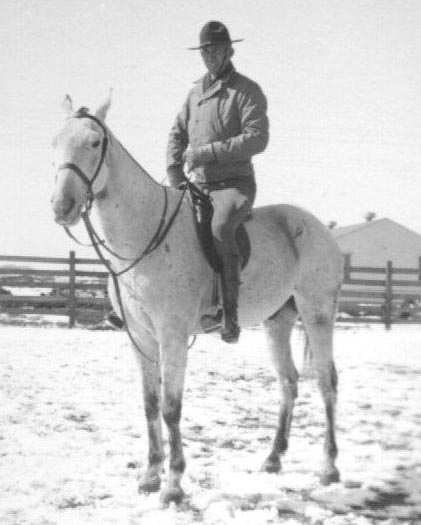
Donald E McKinney Sr on "Steel Dust" Fort Riley, Kansas (1943)
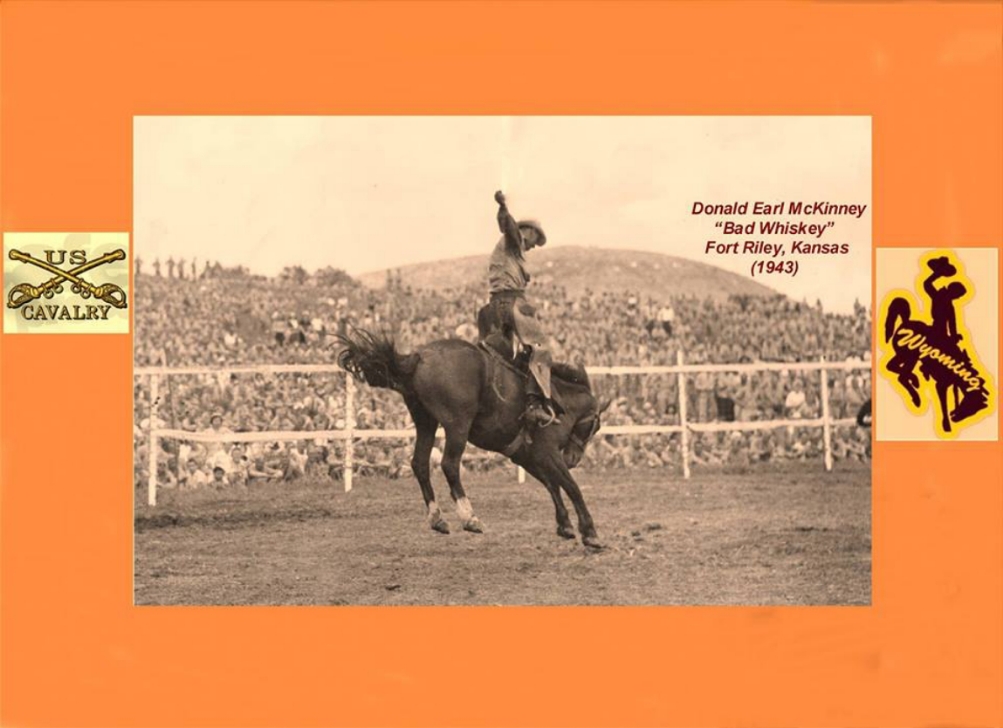
Donald E. McKinney, son of Earl McKinney of Lander, has skipped 2 grades to attain the rank of First Sergeant
at the Cavalry Replacement Training Center at Fort Riley, Kan. Before his induction in October 1941, he was a cowboy & rancher. He is now the highest ranking enlisted man in a pack horse troop at this post."
"There used to be a farm house there and this old lady used to bake us horsemanship instructors cookies. We'd ride up there and get them when we were training troops out here. Over in that area there was the horsemanship training area. There were no trees here then. That was all level and dirt there. The training area was all the way down plum to the other road that goes into Junction City. That road was gravel then. They built that big dike to keep the Republican River from coming over on us. Yeah, we used to ride out across that terrain. We rode all over this damn country." I am glad I have a video record of this tour, because I heard a rumor this historical area will soon be razed to make room for new buildings and training areas for the modern day Army. I hope this is not true.

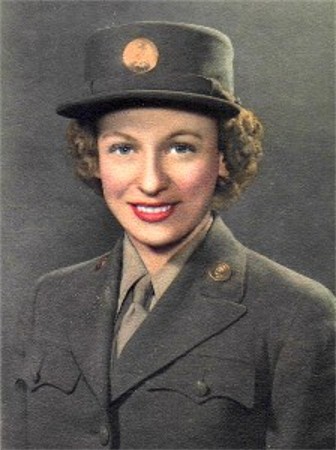
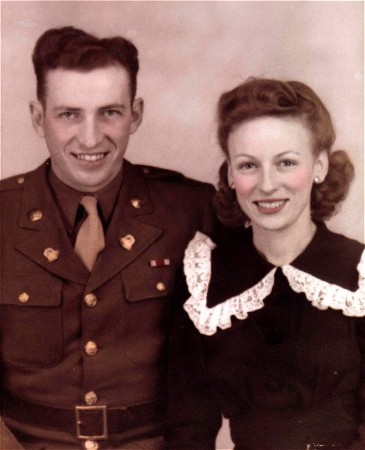
(Note: I remember one incident where he & others were standing under a shack when a Japanese soldier rolled a grenade over the roof & it exploded, completely blowing out the intestines of a nearby officer. Of course he mentioned the huge python snakes they saw in the middle of the road.)
Dear Folks, I should have written sooner but just never got around to it till now. It looks like we are about to have another war. I sure hope we don't. Fort Riley is sending a lot of men to Japan. I don't know when they will send me. They are sending a lot of Infantry men over and I am in the Infantry now. But I don't look to be sent very soon. I hope. I hope you are all fine. I wish you all could come down sometime and see us. Love to all, Donald & Family." (Letter from Donald E. McKinney, Sr to his parents)
Dear Folks, I am leaving tonight for Korea. I didn't get much time just long enough to take care of my business here. I am leaving Tommie and boys here in Junction City while I am gone. Don't know when I will get back but hope it isn't too long. I will send my address when I get there. Tell everyone hello. Love to all, Donald."
(Letter from Donald E. McKinney Sr to his parents)
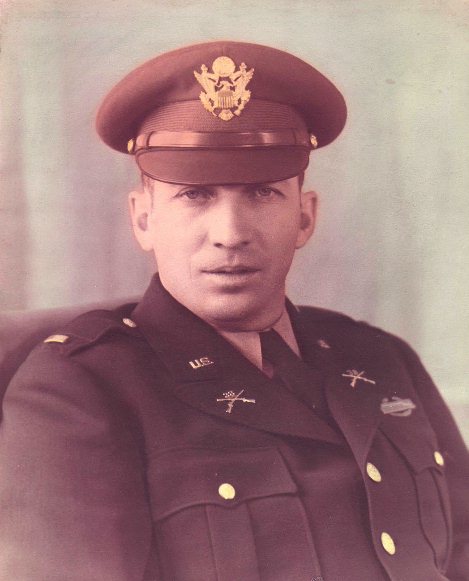 Junction City Union, Junction City, Kansas, Dec 1950.
Junction City Union, Junction City, Kansas, Dec 1950.
"LT. M'KINNEY INJURED-Flown to Hospital in Japan After Injury in Korea November 29. Mrs Donald E. McKinney, of 530 West Seventh street, received a telegram Wednesday evening from the War department stating that her husband, second Lieut.D.E. McKinney, had been injured in Korea on November 29. He was flown to a hospital in Japan for treatment. Mrs McKinney received a letter this morning from her husband written on November 30 saying he was getting along all right except for a chest injury received from concussion when a shell exploded. Lieut. McKinney has been in the army since 1941 and was on duty at Fort Riley except for three assignments overseas. He served in the China-Burma-India theater in 1944 and 1945. In 1949 he was again sent to Japan for duty. He returned here for a short time and left in August of this year for Korea."
(Note: Dad said the top of Lt Lombardo’s head was completely blown off. Dad was standing right beside him & I am sure Korea must have felt like “hell on earth“. Our father was a Master Sergeant/First Sergeant who had been recommended for a battlefield commission by Lt Lombardo & was commissioned 2d Lieutenant in October 1950, the month after Lt Lombardo was killed. Dad said his outfit was completely surrounded and overrun by the Chinese on several occasions. Once, while under defensive cover in a tent, Dad remembered shooting a Chinaman between the eyes with his .45 pistol & his eyes popped out. It was a split second action & all he could really see were his gold teeth.)
"As you must know, I thought very highly of your father. He served me very well in Alaska and when he came to see me in Ft Riley in 1961-2 looking for employment I sure was glad to see him. The post credit union was in a mess and needed sharp and strong leadership. I knew your father could straighten it out and put it on a firm footing. He did exactly that. Your father believed there was but one way to do things-the right way-and that is how he carried out every mission he was given."
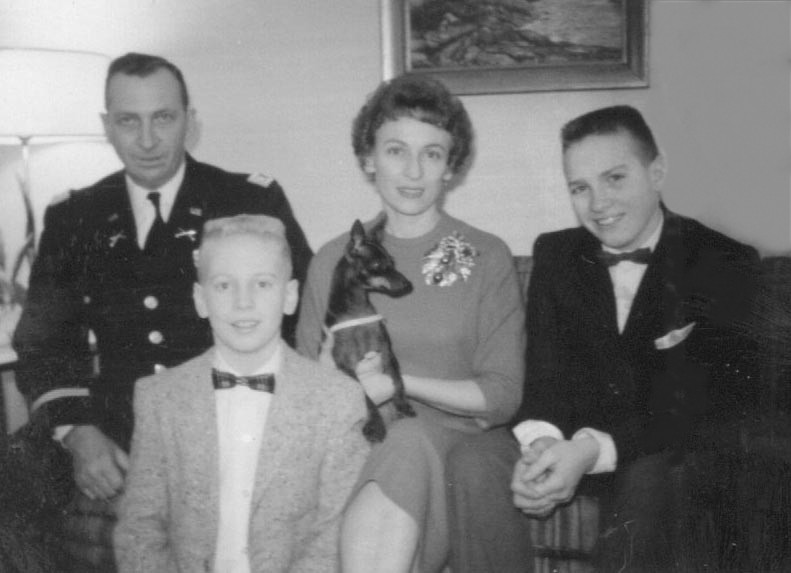
THIS PAGE & MY ENTIRE FAMILY HISTORY DOMAIN IS PROTECTED BY AWARD WINNING "SITELOCK SECURE".
I PAY A MONTHLY FEE FOR THIS PROTECTION vs A SSL CERTIFICATE.
